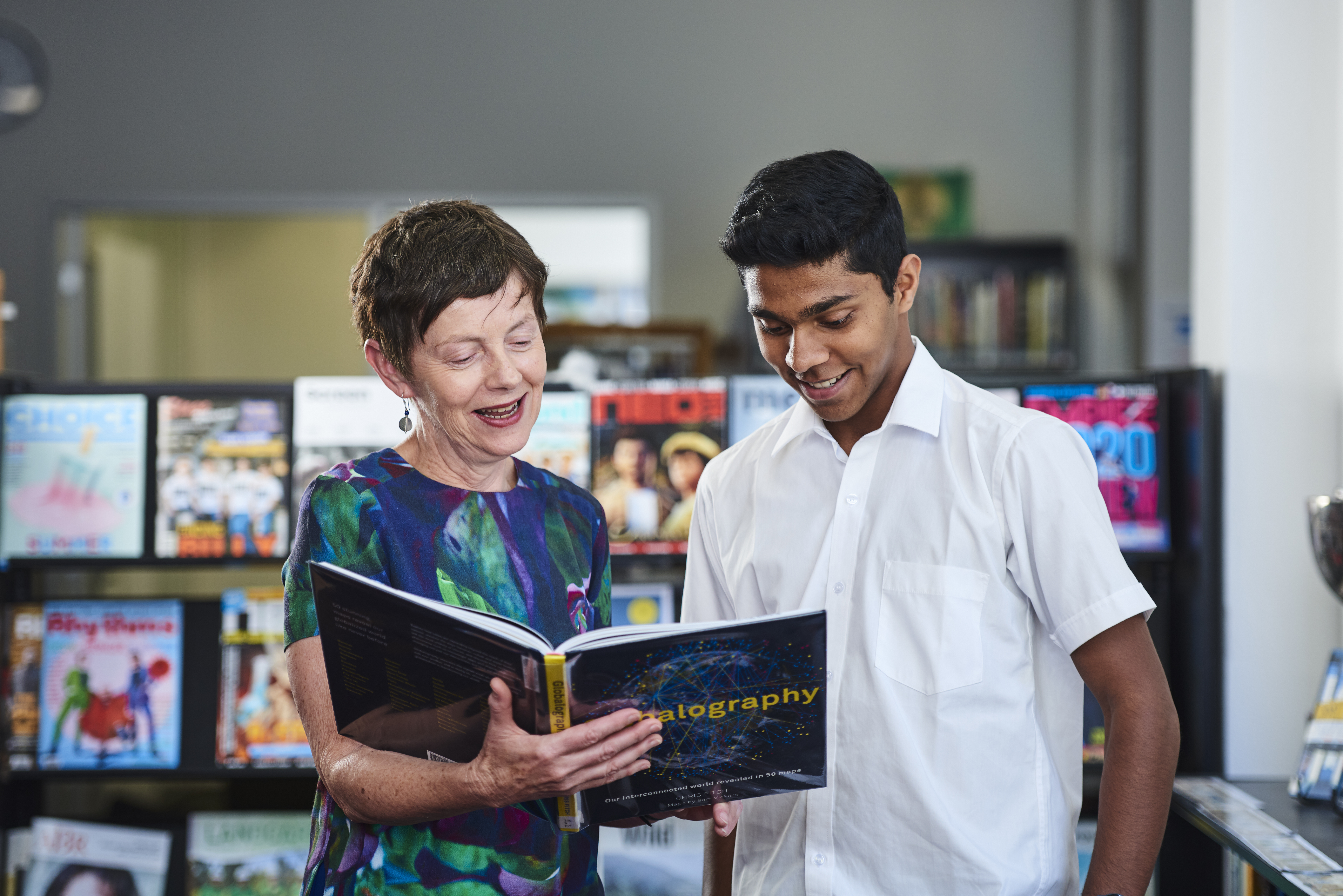Issue 113
Term 2 2020
Working together to ensure student access to high-quality school library services
The strategic focus for the Students Need School Libraries campaign in 2020 is to break out of the school library ‘bubble’. Holly Godfree, Students Need School Libraries campaign coordinator, explores the techniques school library staff can use to support the #StudentsNeedSchoolLibraries campaign.

Tell me if this sounds familiar:
A local group of school library staff are meeting to share ideas. One teacher librarian, let’s call her Janice, is describing how she’s been building a culture of reading with her Year 6 students — trying to reverse the trend we see of teenagers turning away from reading. She’s got evidence to show the success of her efforts: borrowing rates increasing, students love coming to the library, classroom teachers are happy. You’re listening and thinking, ‘Wow! These are great ideas. Janice is at the top of her game. I’m going to try some of these things at my school.’
Later in the session, talk turns to school library advocacy: the lack of positions being advertised, qualified staff retiring and not being replaced. What can we do? The next thing you know, Janice is crying, sharing how she just found out that morning that she’s been pulled out of the library next year and put back into the classroom.
Wait a minute ... What?!
Janice is not some anti-social, disorganised ‘shusher’; she is a high-functioning leader, delivering best-practice services and getting results for her school community. She’s exactly the right type of person — a qualified professional — that students and teachers need to have in a high-impact, far-reaching library role.
How do we explain this? We know it’s a tangled knot of issues leading to this calamity for this school and this person: technological disruption, ‘invisible’ services, budgetary pressures, crowded curriculum — the list goes on and on. Sure, some of these things are beyond our control, but the problem is that we know that high-quality school library services are essential for our students. They create a real-life ‘room of requirement’ for individuals and the entire
school through these four pillars:
- Reading: the foundation for lifelong learning — the portal to countless ways of thinking and being
- Research: it’s more important now than ever before to be able to do this well
- Relationships: the key to counteract mental health problems, build resilience in times of need, and thrive in life
- Resources: curated collections save people time.
School library services have always been part of the safety net and the trampoline to both support and bounce our students and teachers to higher achievements. Right now, in a time of fear, change, doubt, and division around the world, we can argue that strong school libraries are a balm and a bolster to proactively help young people and educators to best meet the challenges we face. And, yet, high-performing, specialist experts like Janice are being pulled out of their roles.
So, now what? Head in the sand? Rant and rave? Fetal position in the corner? For those who have worked through these stages of grief, I offer you the Students Need School Libraries campaign, launched in October 2018, and a list of small, medium and large actions that you can do — actions, in fact, that we need to do if we want to fight for what is right.
The biggest achievement of our campaign’s first year was that we permeated the Australian school library community. Some stats at the end of that year: our newsletter has 600+ subscribers; our website has had 45,800+ hits; our films have had 10,000+ views; our Facebook, Twitter and Instagram accounts have had a combined 5,400+ followers. These are wonderful achievements, but they are only the very beginning.
School library people already knew there was a problem with school library staffing being in a long decline. We already know what that void in a school library means for students and teachers. However, most people in the world still have no idea that this is a problem or why it matters. Hence, the strategic focus for the Students Need School Libraries campaign in 2020 is to break out of the school library ‘bubble’.
The strategic focus for the Students Need School Libraries campaign in 2020 is to break out of the school library ‘bubble’.
Here comes the hard part: We’re asking you to do things. We can only achieve our goals with widespread, local groundswells of support. This is your sphere of influence. These are the things we can control. The decision about school library staffing lies ultimately with principals and politicians. The way to influence that decision is to get parents advocating for their children’s school libraries.
Feeling shy? Too busy? Uncomfortable? Perfectly understandable ... Do it anyway. We are here to help. Let’s work together.
Tap into your professional confidence. Everything is hard until it is easy. What you (yes, you!) can do:
- Connect with our campaign on social media or via the newsletter. Stay in the loop as we evolve.
- Do your job well and document events. We are collecting short stories to build a mosaic illustrating how school library staff and services are important in distance learning.
▶ Make a few notes (before we all move on and forget the detail) about that time when the COVID-19 situation began to impact us: What specific problems did you help your school community solve? What impact did those efforts have on students and staff?
After physical distancing restrictions are eased, you can:
- Share our resources in 10+ places — businesses, organisations, workplace kitchen areas, anywhere non–school library people will see it. Visit studentsneedschoollibraries.org.au/resources.
- Talk to people (actually, this can happen any time!): connect the dots about how school libraries provide solutions to important problems:
▶ When someone you are with talks about ‘fake news’, you talk about how school library staff teach website evaluation.
▶ When a friend talks about their child’s teacher, you ask about the school library services at that school and talk about how collaborating with teachers is core business for the library and how what helps teachers also helps students.
▶ When someone confides that their child is getting bullied, you talk about how the physical space of a school library, the rich perspectives offered by literature and the unique role of school library staff are essential components of the multi-pronged approach for schools to successfully address tricky social issues.
▶ When you read an article about Australia’s falling scores on literacy, or some other testing, you write in to that media outlet talking about how strong school libraries, run by qualified staff, are known to improve these outcomes and that all students need that — not just the lucky few. - Give a presentation about what school libraries can and should be like to:
▶ parent groups at a school with no qualified school library staff
▶ your local council
▶ your education minister.

7 Signs Your Child Needs Help From Their School Library flyer.
- Actively work with your union on issues related to school library staffing and working conditions. This is a vital tactic. Education unions know that what benefits educators also benefits students. Unions are democratic organisations — numbers are what matter. A cause like ours is actually easy to get numbers behind because it makes so much sense.
▶ Set a goal; for example, promote the 7 Signs Your Child Needs Help From Their School Library flyer with all members.
▶ Write a motion. Speak persuasively, asking people to vote for it.
▶ Rinse and repeat. - Write a short letter (doesn’t have to be fancy) to:
▶ the editor of a newspaper
▶ a person in the public eye who might like to support our campaign. - Be an active agent: We’re practitioners just like you, and we welcome your ideas.
Make no mistake. We can achieve the vision. But, of course, the opposite is also true. We might not get strong school libraries for all students. We might continue down the path of inequity, cuts, rising stress levels, increasing workload for classroom teachers and declining results for students. Success will come down to a collective effort — tens of thousands of small/medium/large actions (and some stars aligning in our favour). I am one among many giving it my very best shot. If you’re not already an active campaigner, I hope you will join us. Your students need you.
Visit studentsneedschoollibraries.org.au or find them on Facebook and Instagram @studentsneedschoollibraries, or Twitter @NeedSchoolLibs.
Image credits
Images supplied by Holly Godfree. Cover image supplied by SCIS.
Parts of this article are reprinted with permission from School Library Association of Victoria (SLAV) FYI magazine.
